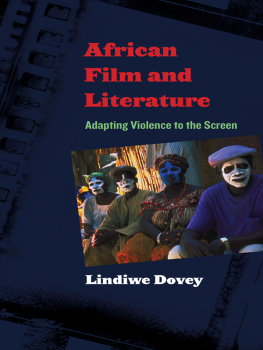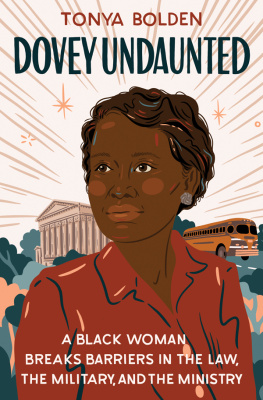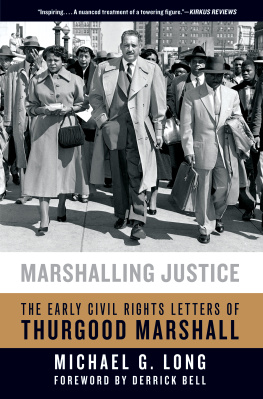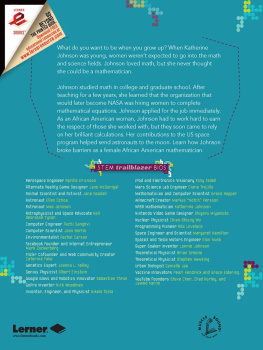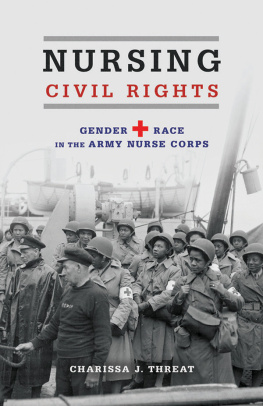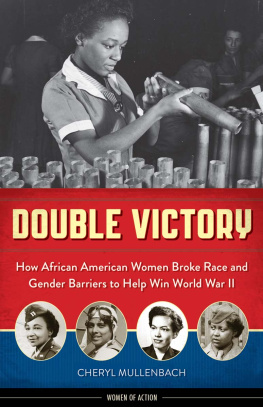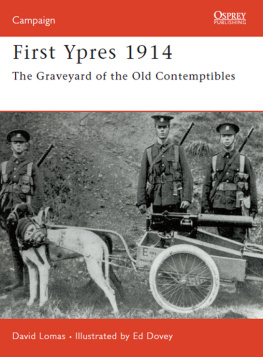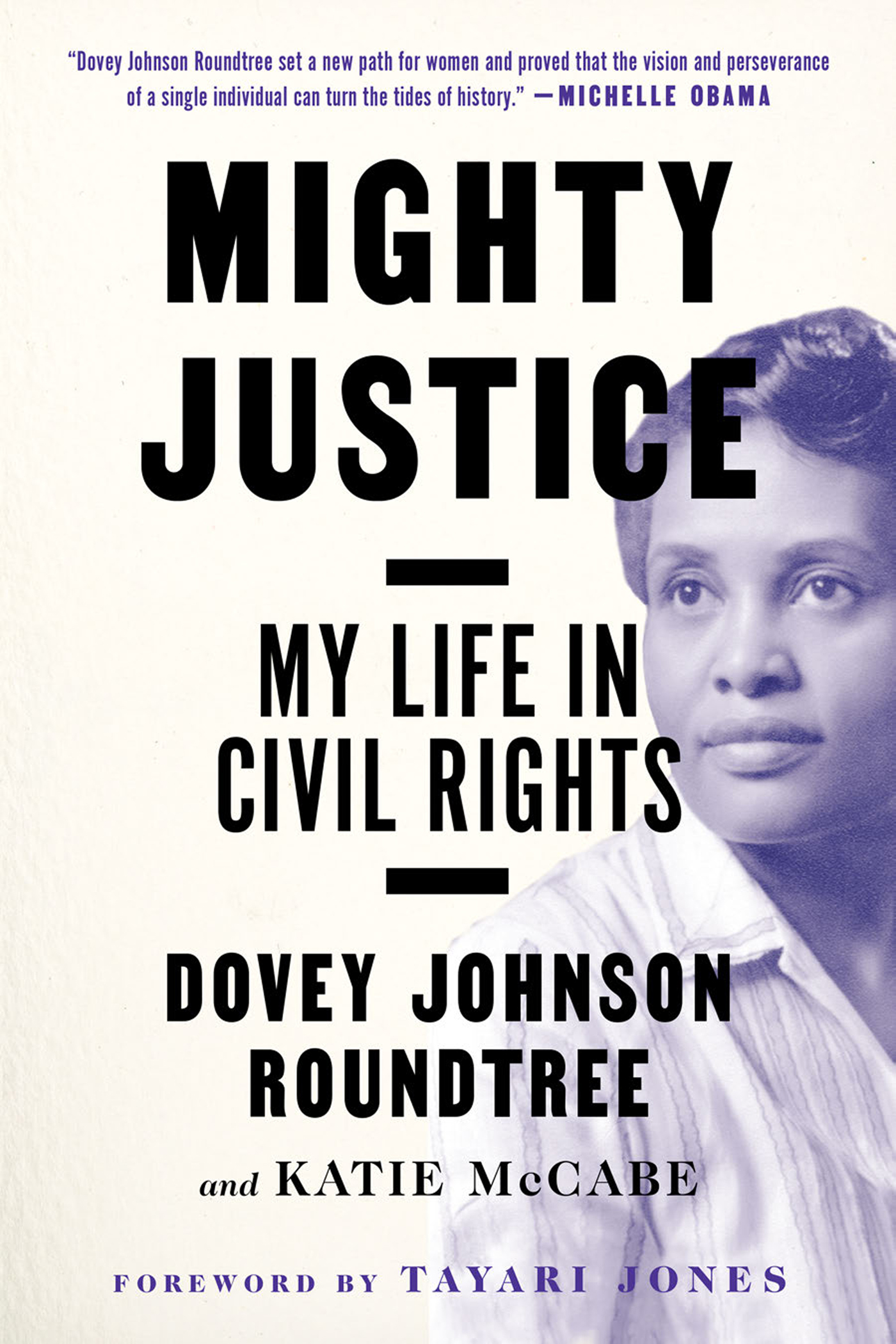Contents
Guide
Page List
P raise for Mighty Justice
An amazing story that humanizes the raw emotions of thousands of early twentieth-century achievers living the dreams of the entire African American community. Citation of the Judges , 2009 Letitia Woods Brown Memorial Book Prize
American history and human history at its best. Walter J. Leonard , Founding Committee Chair of the W. E. B. Du Bois Institute for African and African American Research, Harvard University
To read how Dovey Roundtree struggled to help others and to make a difference in our world is exalting. This book tells what one determined, unstoppable woman did with her life to change laws and traditions to make America a better, fairer, and more respectful country. Brig. Gen. Wilma L. Vaught, USAF (Ret.), President Emeritus of the Board of Directors, Women in Military Service for America Memorial Foundation, Inc.
Beautifully and engagingly told. Johnnetta Betsch Cole , President Emerita, Spelman College and Bennett College for Women
Manages to immerse readers in Roundtrees life, creating a real sense of what it was like to live as a black person in segregated Charlotte and the Jim Crow South. Pam Kelley , The Charlotte Observer
Dovey Roundtree is my hero. This is not only a great read, but a must read. I recommend it to anyone thinking about justice or trying to find ways to overcome the challenges they face. Charles J. Ogletree , Professor and Executive Director of the Charles Hamilton Houston Institute for Race and Justice at Harvard Law School
Roundtree never gave up on America. Her story is at the same time infuriating, heartbreaking, moving, joyous, and powerful. Read it and you will feel inspired. Liza Mundy , New York Times bestselling author of Code Girls
Dovey Johnson Roundtree set a new path for women and proved that the vision and perseverance of a single individual can help turn the tides of history. Michelle Obama
M ighty J ustice
My Life in Civil Rights

Dovey Johnson Roundtree
and
KATIE M c CABE

Algonquin Books of Chapel Hill 2019
To the memory of my grandmother, Rachel Bryant Graham, the greatest warrior I ever knew
D. J. R.
and
To the memory of my parents: John T. Burns, who loved the law, and Kathleen Hynes Burns, who loved the dawn; and to both of them, who loved words and taught me to love them too
K. J. M.
C ontents
foreword
by Tayari Jones
Chapter 1
Walking Unafraid
Chapter 2
Making Somethin of Yourself
Chapter 3
Pass It On
Spelman and the Legacy of Mae Neptune
Chapter 4
My America
Chapter 5
Everybodys War
Chapter 6
Uneasy Peace
Chapter 7
Making War on a Lie
The Assault on Plessy v. Ferguson
Chapter 8
Taking on The Supreme Court of the Confederacy
The Case of Sarah Louise Keys
Chapter 9
At the Threshold of Justice
Chapter 10
Out of the Darkness
Chapter 11
Peer of the Most Powerful
Chapter 12
Healing the Brokenness
afterword
by Katie McCabe
Foreword
C alled to W itness
We have all heard that the arc of the moral universe bends toward justice, but during dark and difficult times, its sometimes a challenge to see it curving in the right direction. History tells us the stories of the great mencharismatic, brave, and doomedwho gave their lives to the struggle for racial equality. While these men earned our praise, we know that they did not change the world alone. Mighty Justice is the story of a great woman, Dovey Johnson Roundtree, who dedicated her life to moving the United States closer to ideals outlined in the Constitution. Born in 1914 in Charlotte, North Carolina, Dovey Roundtree came into this world with her mind stayed on freedom, as the sixties protest song goes.
This is a love story. Dovey Johnson Roundtree was a patriot, in love with a flawed, unfair, and often cruel nation. One of her earliest memories was the sight of her grandmothers feet, misshapen and gnarled as a result of violence at the hands of an angry white man. But along with her memory of the damage done her grandmothers body, she recalls herself on bended knee, kneading and massaging the same feet, providing comfort to the woman who had been brave enough to say no in the face of power and paid the price. Even as a small child, Dovey Johnson Roundtree understood that the ultimate act of love is service.
I wonder how Dovey Johnson Roundtree would want this work to be discussed. I am sure many will read this story, as I did, and marvel that her name and contributions are not better known. Still, I resist the impulse to call her a hidden figure, the term coined to honor the black women whose unsung contributions to NASA helped put a man on the moon. But I cant imagine that Ms. Roundtree would cotton to such a description. While she was no doubt aware that hers was not a household name, I am not convinced she would consider that a tragedy. There is a hymn well-loved in the African Methodist Episcopal Church that proclaims, Let the work Ive done speak for me.
Hers was a life of constant contribution. In the 1940s, she heeded the call of the great Mary McLeod Bethune and joined the first class of African American women to be trained as officers in the Womens Army Auxiliary Corps, lending her skills to support the war effort. These difficult years capture the paradox of her experience as a black woman in the United States. She was a proud American, eager to represent her country in World War II. The term the Greatest Generation conjures images of handsome young soldiers storming European beaches before returning home triumphant in uniform, and then another image of these same men, old and wizened, festooned with medals, entering the White House in wheelchairs. But a generation is a vast and diverse marker. Also part of this generation were the women who worked as switchboard operators, mechanics, bakers, whose labors supported the men on the battlefield. And among them were the black women who challenged segregationand sometimes won, but other times were excluded, penalized, and humiliated for their efforts.
Ms. Roundtree herself faced the pain of being shunned by the country she had so well served. As a young servicewoman, she insisted upon her right to a seat in the white section on a segregated bus. She was thrown off the bus and forced to remain for several hours in a deserted bus depot. This would be a dangerous situation for any woman, but for a black woman the threat was infinitely more grave. This incident stayed with her long after she was safe at home. In the struggle for freedom, Ms. Roundtree was deeply invested not just from an abstract respect for the ideals of the nation, but from her own yearning to live free.
She found her calling as a lawyer. In her own words, The promise of the law lifted me, when so much else weighed me down. Careful parsing of Plessy v. Ferguson, the most destructive decision in the history of the Supreme Court, demonstrated how thoroughly Jim Crow rested on sand. Law school was demanding: Ms. Roundtree worked two part-time jobs to support her studies and struggled with her health. Still, as someone would say decades later, nevertheless she persisted. As with her experience in the military, she had to fight discrimination in law school. Howard University is a historically black university, but she was one of the few women in her class. Still, she studied alongside the men, winning their respect and in some cases lifelong friendship through a shared sense of mission, a deep faith in the promise of the law.


